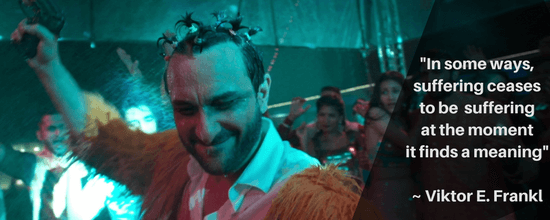Kaalakaandi: A Genetic Counseling Review
Jan 17, 2018
25095 Views
If you’ve watched neither the movie nor the trailer of Kaalakaandi, stop here!! This blog post is actually gonna talk about the movie and isn’t just click bait. If you’ve watched the trailer, but not the movie, it’s ok…. you’re good to go ahead.
I have 3 confessions to make:
- I watched Kaalakaandi over the weekend. By choice.
- I liked it (and couldn’t help but also tip my hat to good ol’ James Hadley Chase!)
- I loved that the movie, albeit all too briefly, mentioned “genetic predisposition” to stomach cancer
As a genetic counselor who has spoken to several patients about their cancer diagnoses over the past 10 years of genetic counseling practice, the things Saif Ali Khan’s character says to his doctor (whose diagnosis-declaration skills warranted serious sensitivity training) after hearing his diagnosis of stomach cancer are things I have heard often:
- But I don’t drink
- I lead a healthy lifestyle
- I work out 5 days a week
- I eat a lot of fruits and vegetables
- I have never smoked a single cigarette my whole life
And, finally,
- I am a good person
My heart went out to the protagonist. It’s called, empathy.
These statements reflect the natural thought-process of someone who is grappling with making sense of a life-altering piece of information. A diagnosis of cancer- for oneself or a family member- can be one such life-altering event. And one of the important ways that people try to make sense of traumatic life events is by understanding why the event happened. It’s what experts in psychology call, ‘causal attribution’. With a diagnosis of cancer, “why” the cancer happened can partly be answered by risk factors individuals may be aware of (such as dietary and lifestyle choices), as well as invisible genetic risk factors in one’s DNA that individuals may have no clue about. In the absence of known risk factors, the question “how did I get cancer” gets no answer, thwarting the process of making sense of this distressing life event. The statement, “I’m a good person”, reflects Saif Ali Khan’s character’s struggle to understand the diagnosis- not only from a medical standpoint but also, possibly, an existential one. Why? Why me?
Oftentimes, genetics can offer helpful information about why someone may have developed cancer. A genetic predisposition oftentimes manifests as a diagnosis of cancer in the family. Just like the time in the movie when Saif Ali Khan’s character alluded to his familiarity of cancer thanks to his own Father’s diagnosis of cancer. Finding a causal attribution is an important component of the process of finding meaning in life events. Several studies among cancer patients have shown what Park and Folkman’s ‘meaning making model’ suggested- that finding meaning is associated with psychological wellbeing, greater adjustment, and lesser distress.

We know that factors that increase the risk of cancers include smoking, obesity, sedentary lifestyle, drinking too much alcohol, poor nutrition, etc. As a corollary, one’s risk for cancer can be reduced by not smoking, eating plenty fruits, veggies and whole grains, maintaining healthy weight, avoiding excessive consumption of alcohol, not eating too much red meat, avoiding overexposure to sunlight, etc. Because the risks from these dietary and lifestyle-based risk factors can be modified, they are called ‘modifiable risk factors’. There are ‘non-modifiable’ risk factors as well- things like age (can’t do much about age despite what some commercials tell you) and sex (unless, of course, gender-reassignment surgery has been on your mind). Another important non-modifiable risk factor is your genetics. It is one that gets brought to attention through family history and/or genetic testing. While it might seem scary to seek out information about one’s genetic risk, knowing your genetic risk can help put into place prevention-focused strategies for risk reduction and screening. Screening, in turn, can be life-saving as early detection is associated with increased survival. Regular screening can detect cancer in extremely early stages of cancer (sometimes, even at a pre-cancerous stage) when the cancer is most amenable to successful treatment. As we say in the medical world,
Early diagnosis = Better prognosis
There used to be a time when, because of a lack of medical understanding and treatment, a diagnosis of cancer was thought of as a curse for bad deeds. It was, sadly, considered a taboo subject that no one ever talked about. This was unfortunate, because we now know that cancer is not a curse for bad deeds, and it helps to talk about it. We now know that cancer is a medical condition that involves abnormal cell growth. This abnormal cell growth occurs because of a genetic change that hinders the body’s intrinsic ability to identify and get rid of any abnormally-growing cells. Oftentimes these genetic changes can be acquired by lifestyle risk factors- we know that smoking causes cancer because of the carcinogenic effect of the chemicals in cigarette smoke. But sometimes, a genetic predisposition can be inherited, increasing the susceptibility of cells to grow abnormally. Unchecked, these rogue cells have the potential to spread to other parts of the body- a process called metastasis- which is what happened to our protagonist.
Our protagonist in Kaalakaandi would likely have been diagnosed with early stage cancer and have had incredibly high odds of beating the disease with surgery (which is the gold standard treatment for stomach cancer) had he screened regularly for early detection. According to the survival rates published in 2017 by the National Cancer Database (NCDB), the survival rate for stomach cancer is a brilliant 94% if detected at Stage IA. This survival rate drops dramatically to a disheartening 18% if detected at the advanced stage of Stage IIIC.
| Stage of Stomach Cancer | 5-year Survival Rate |
| IA | 94% |
| IB | 88% |
| IIA | 82% |
| IIB | 68% |
| IIIA | 54% |
| IIIB | 36% |
| IIIC | 18% |
Such survival rate trends are true for all kinds of cancers- breast, lung, prostate, colon, stomach, etc. Sadly, most people are too scared to screen regularly, and are faced with their worst fears when a screening test, done all too late, ends up diagnosing them with an advanced stage of cancer. Its the worst kind of self-fulfilling prophecy- “If I screen, they might find something”.

However, I’m not gonna blame our protagonist. What I am gonna do instead, is strongly recommend that you speak with a genetic counselor if you have a family history of cancer. Genetic counselors are health care professionals that have specialized expertise in medical genetics as well as psychological counseling. They understand that a diagnosis of cancer is not only medically, but also psychologically challenging- for the patient as well as for the family.
We can either bury our heads in the sand and be “surprised” by a shocking diagnosis at a late stage, or participate proactively in our own healthcare and speak to a genetic counselor to understand our cancer risks, make a plan to address this risk, and screen regularly. The choice is our own. And I urge you to make the best choice for yourself. If you have a family history of cancer, speak to a genetic counselor today- It could be the smartest thing you do for your health.
Enjoy the movie, share this article, and also that caramel popcorn!
